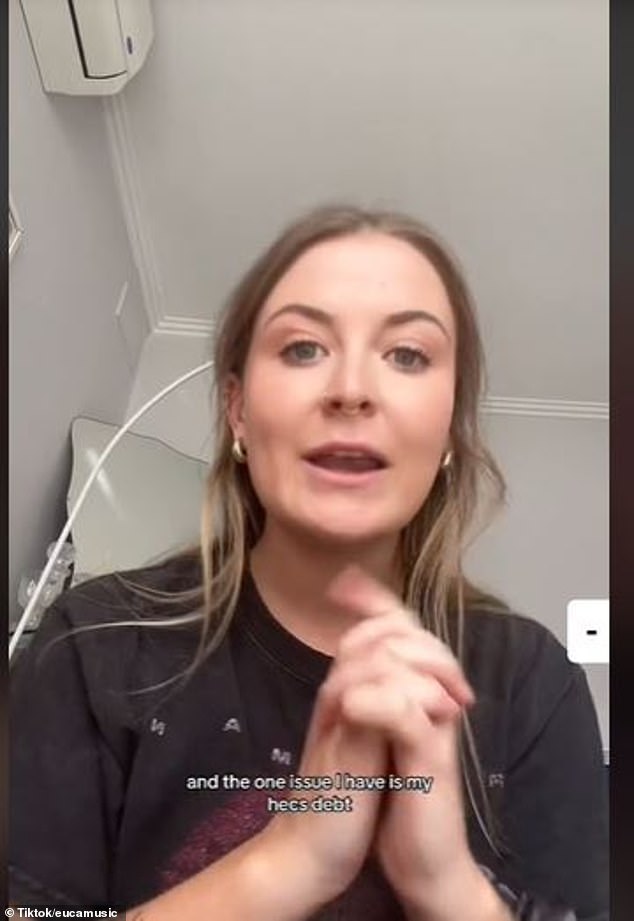Young homebuyer fumes over infuriating reason she can’t get a decent loan from the bank: ‘Tell me why’
A young homebuyer has expressed her frustration after revealing the infuriating reason why her borrowing power was affected while applying for a bank loan.
Melbourne musician Euca hit out in a TikTok video revealing how her HECS-HELP debt had negatively affected her.
“The only problem I have is my bloody HECS debt… I’m told it doesn’t even matter how much HECS debt I have,” she said.
“It could be $100,000, it could be $5,000, and the problem is exactly the same.
‘So I now have to use my home deposits that I’ve been saving for years to pay off my HECS debt and pretty much start over.’
Euca said she didn’t want to buy a house to use as an investment property, revealing she just really wanted a place to live.
Melbourne-based musician Euca hit out in a TikTok video revealing how her HECS-HELP debt had negatively affected her
“I just want to buy a cheap house in Coffs Harbor (NSW) that isn’t very expensive, it’s actually very affordable (compared to) everywhere else,” she said.
“Tell me why I now have to pay off $33,000 of my HECS debt to essentially have any borrowing power.”
The musician said that even if she paid off $30,000 of her student loan debt and still owed $3,000, it would make no difference to her borrowing power.
Euca said she didn’t understand why this was the case, but then tried to explain.
“It’s really all because I’m a sole proprietorship,” she said.
‘I still have a normal income and also a job. But because you’re a sole proprietorship, the hoops you have to jump through are different.
‘It has to do with my specific situation. Does that mean it’s less s***? No.’
She told her followers that she makes ‘good money’ as a wedding singer and DJ and has been doing this for 13 years.
“But it’s not enough because of the way all this shit works, because of all the arbitrary policies,” she said.
Euca said she isn’t being held back because she doesn’t have enough money, revealing that she has enough for a down payment and to make the refunds.
‘It’s my bloody HECS debts that are the problem and it just kills me because you’re told that when you go to university… the impression I had was that I would just pay it off on my tax returns . and that will be that, (but) no,” she said.
She further explained that her income as a sole proprietor is also affected by career purchases, such as purchasing new equipment, which reduces her profits when she reports them on her tax return.
Euca also said she has been advised to pay herself a fortnightly salary from her singing and DJ income, which means “the money has to be transferred from my business account to my access account.”
‘Why is that important? The money still comes into my account (but) apparently it matters,” she said.
Euca revealed she had a part-time job three days a week, but that was suddenly reduced to just one day in November.
She claimed that the combination of reduced working hours, HECS-HELP debt and her sole trader status all affected her chances when she went to the bank.
Many social media users advised her to try another bank or go through a broker, saying they managed to get the loan they were looking for despite having HECS-HELP.
Another commenter asked Euca why she saved her money instead of paying off her student loans.
“Paying off debt first and then saving money might be something people should consider,” they said.
Her video comes as the federal government announced millions of young Aussies could pay $1,000 less a year in student loans through a “shake-up” of the HECS-HELP system to make it “fairer and simpler”.

In an impassioned and often swearing tirade, Euca (pictured) said: ‘The only problem I have is my bloody HECS debt… I was told it doesn’t even matter how much HECS debt I have
Education Minister Jason Clare flagged the possible change after publishing the biggest overhaul of the higher education system on Sunday.
The most notable suggestions were to reduce HECS-HELP repayments and introduce a tiered repayment structure where lower-income graduates repay less.
“For example, if we were to go down this route, it says that someone with an income of $75,000 a year would pay about $1,000 less every year,” Mr Clare said.
Euca hopes that the changes in the law, which could help her get a mortgage, will arrive sooner or later.
